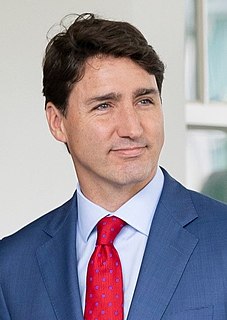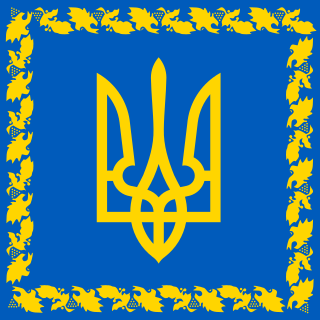
A prime minister or a premier is the head of the cabinet and the leader of the ministers in the executive branch of government, often in a parliamentary or semi-presidential system. Under those systems, a prime minister is not the head of state or a monarch, but rather the head of government, serving typically under a monarch in a democratic constitutional monarchy or under a president in a republican form of government.

The prime minister of Australia is the head of government of the Commonwealth of Australia. The prime minister heads the executive branch of the federal government of Australia and is also accountable to federal parliament under the principles of responsible government. The incumbent prime minister is Scott Morrison, who took office in 2018 as leader of the Liberal Party.

The prime minister of Canada is the first minister of the Crown. The prime minister is the head of government for Canada, chairs and selects the membership of the Cabinet, and advises the Crown on the exercise of executive power and much of the royal prerogative. As prime ministers hold office by virtue of their ability to command the confidence of the elected House of Commons, they typically sit as a member of Parliament (MP) and lead the largest party or a coalition in the House of Commons.

The prime minister of the United Kingdom is the head of government in the United Kingdom. The prime minister advises the sovereign on the exercise of much of the royal prerogative, chairs the Cabinet and selects its ministers. As modern prime ministers hold office by virtue of their ability to command the confidence of the House of Commons, they sit as a member of Parliament.

The prime minister of India is the head of government of the Republic of India. Although the President of India is the constitutional, nominal, or ceremonial head of state, in practice and ordinarily, the executive authority is vested in the Prime Minister and their chosen Council of Ministers. The prime minister is the leader elected by the party with a majority in the lower house of the Indian parliament, the Lok Sabha, which is the main legislative body in the Republic of India. The prime minister and their cabinet are at all times responsible to the Lok Sabha. The prime minister can be a member of the Lok Sabha or of the Rajya Sabha, the upper house of the parliament. The prime minister ranks third in the order of precedence.

The prime minister of Japan is the head of the executive branch of the government of Japan. The prime minister directs the National Cabinet and is the commander-in-chief of the Japan Self-Defense Forces; he is appointed by the emperor of Japan after being designated by the National Diet and must enjoy the confidence of the House of Representatives to remain in office. He is the head of the Cabinet and appoints and dismisses the other ministers of state. The literal translation of the Japanese name for the office is Minister for the Comprehensive Administration of the Cabinet.
The head of government is either the highest or the second-highest official in the executive branch of a sovereign state, a federated state, or a self-governing colony, autonomous region, or other government who often presides over a cabinet, a group of ministers or secretaries who lead executive departments. "Head of government" is often differentiated from "head of state", as they may be separate positions, individuals, or roles depending on the country.

The Prime Minister of Pakistan, officially the Prime Minister of the Islamic Republic of Pakistan, is the constitutional head of government of Pakistan and designated as the "Chief Executive of Islamic Republic".

The Government of India, also known as the Central or Union Government or simply the Centre, is the union government created by the Constitution of India as the legislative, executive and judicial authority to govern the union of twenty eight states and eight union territories. The seat of the government is located in New Delhi, Delhi.
A minister is a politician who heads a ministry, making and implementing decisions on policies in conjunction with the other ministers. In some jurisdictions the head of government is also a minister and is designated the ‘prime minister’, ‘premier’, ‘chief minister’, ‘chancellor’ or other title.
The Union Council of Ministers exercises executive authority in the Republic of India. It consists of Cabinet Ministers, Minister of State and Ministers of State. The council is led by the Prime Minister of India.

Sergei Kuzhugetovich Shoigu is a Russian politician and General of the Army who has served as Minister of Defence of the Russian Federation since 2012. Shoigu has also served as Chairman of the Council of Ministers of Defense of the Commonwealth of Independent States since 2012. Previously, Shoigu was Minister of Emergency Situations from 1991 to 2012, and briefly served as Governor of Moscow Oblast in 2012. A close confidant and ally of Vladimir Putin, Shoigu belongs to the siloviki of Putin's inner circle. Shoigu is responsible for the planning and execution of the 2022 Russian invasion of Ukraine.

Farooq Abdullah is an Indian politician and President of Jammu & Kashmir National Conference. He has served as the Chief Minister of Jammu and Kashmir on several occasions since 1982, and as the union minister for New and Renewable Energy between 2009 and 2014. He is the son of the 1st elected Prime Minister of Jammu and Kashmir Sheikh Abdullah, and father of former Chief Minister of Jammu and Kashmir Omar Abdullah.

The G20 or Group of Twenty is an intergovernmental forum comprising 19 countries and the European Union (EU). It works to address major issues related to the global economy, such as international financial stability, climate change mitigation, and sustainable development.
The government of Russia exercises executive power in the Russian Federation. The members of the government are the prime minister, the deputy prime ministers, and the federal ministers. It has its legal basis in the Constitution of the Russian Federation and the federal constitutional law "On the Government of the Russian Federation". The Apparatus of the Government of Russia is a governmental body which administrates the activities of the government.

The president of Ukraine is the head of state of Ukraine. The president represents the nation in international relations, administers the foreign political activity of the state, conducts negotiations and concludes international treaties. The president is directly elected by the citizens of Ukraine for a five-year term of office, limited to two terms consecutively.

The Chancellor of Germany, officially the Federal Chancellor of the Federal Republic of Germany, is the head of the federal government of Germany and the commander in chief of the German Armed Forces during wartime. The chancellor is the chief executive of the Federal Cabinet and heads the executive branch. The chancellor is elected by the Bundestag on the proposal of the federal president and without debate.

The Government of the United Kingdom, domestically referred to as Her Majesty's Government, is the central government of the United Kingdom of Great Britain and Northern Ireland. The government is led by the prime minister who selects all the other ministers. The country has had a Conservative-led government since 2010, with successive prime ministers being the then leader of the Conservative Party. The prime minister and their most senior ministers belong to the supreme decision-making committee, known as the Cabinet.












